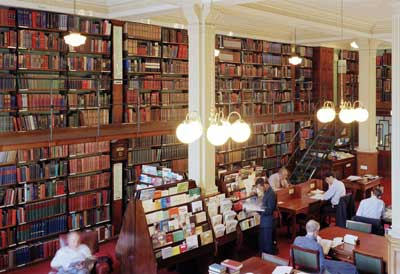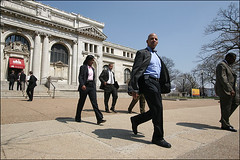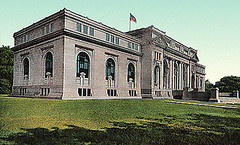The Future of Martin Luther King, Jr., Library Town Hall Meeting, Saturday
 Washington Post photo.
Washington Post photo.As I said in MLK Library: Eyesore or Modern Masterpiece?, which reprinted an email by Stuart Gosswein about this issue, as well as included more discussion, I'm not sure how I feel about proposals to abandon the current Central Library branch in favor of a new facility.
I don't like the current building as a library, but is that because of the design (face it, the inside is equivalent to and as comfortable as an office building), the (lack of) maintenance, or the underfunding of the library system and collection development? I just don't know....
 Reading Room, The London Library (UK).
Reading Room, The London Library (UK).Councilmember Kathy Patterson wrote the following in themail
The memo [that Gary Imhoff] mentioned [in themail, April 12] was dated and delivered Monday, April 10; the Budget Support Act hearing was April 11, and it was during the hearing that I discussed holding a subsequent hearing, which Chairman Cropp then mentioned publicly. I favor considering the issue separately which is why I sent the memo, and we take the bill up for first reading May 9.
(Note: this refers to the inclusion in the City Budget submitted by the Mayor to Council a provision allowing the Mayor to lease the MLK Library for 99 years without further oversight.)
The first order, though, is a more thorough public vetting of the mayor's proposal, which we've scheduled Saturday, April 22, at 1 p.m., at MLK [901 G Street, NW]. It will be a town meeting rather than a public hearing because recess apparently extends through the weekend and I can't hold an official hearing during recess.
_______
This happens with property "disposition."
This happens with funding for cultural institutions such as a proposed $8 million to the Corcoran for roof repairs, and $500,000 to the Heurich Mansion to retire debt. Frankly, I probably support both proposals, but I don't like the fact that we don't have one system, open to proposals from all, which are competitively evaluated and funded.
Another example would be the recent leasing of the Carnegie Library, ex-City Museum, to a new Music Museum pushed for years by the Federal City Council. Since the building is owned by the city, and the City Museum stopped functioning, shouldn't control of the property (and remember that DC also put $27 million into the renovation of this building) revert back to the city?
As long as the "system" is ad-hoc, it is subject to great abuse (such as People's Involvement Corporation saying that some time in the past the DC Government "promised" to give them the building they are in for free--no written documents--and a Councilmember has entered legislation to do just that).
But it appears as if the Growth Machine (developers, elected officials, and other stakeholders) like the lack of system just the way it is... Otherwise, it would be changed.
Also see, "Cash-hungry cities sell assets, sparking fears: Many worry sales hurt quality of life for all and do little to address long-term problems," from the Detroit News. From the article:
Mayor Cameron Priebe took office last fall in shock after learning how much property the city had sold in the previous three years. Priebe discovered that Taylor, facing a budget deficit approaching $6.5 million, had off-loaded $6 million to $8 million in city property over that period to balance its books.
Several communities in Metro Detroit are considering selling golf courses, parking lots and other property in hopes of generating immediate cash and future tax benefits -- a solution that some fear hurts the quality of life for all residents and does little to address long-term problems.
Some see selling assets as a necessary one-time fix; others say it only delays the inevitable reshaping of services and resources that residents expect from their communities. In Taylor, Priebe discovered the city gave developers nearly $30 million in subsidies to build on the land.
 Washington Post photo. Date: 03/30/06 Caption: Celebration of a New Partnership; The Historical Society of Washington, D.C. and the National Music Center at the Carnegie Library Building--City Museum. Mayor Williams was guest speaker. Mayor Anthony Williams leaves Museum after speaking.
Washington Post photo. Date: 03/30/06 Caption: Celebration of a New Partnership; The Historical Society of Washington, D.C. and the National Music Center at the Carnegie Library Building--City Museum. Mayor Williams was guest speaker. Mayor Anthony Williams leaves Museum after speaking. Carnegie Library, Washington, DC. Historical image, source unknown.
Carnegie Library, Washington, DC. Historical image, source unknown.Index Keywords: library; public-assets



0 Comments:
Post a Comment
<< Home